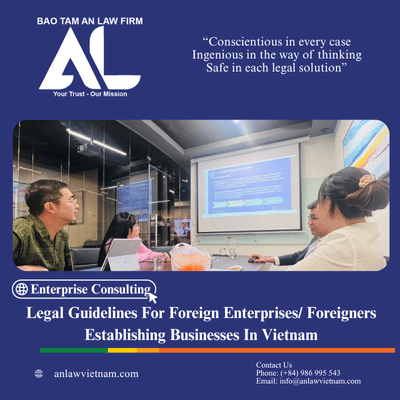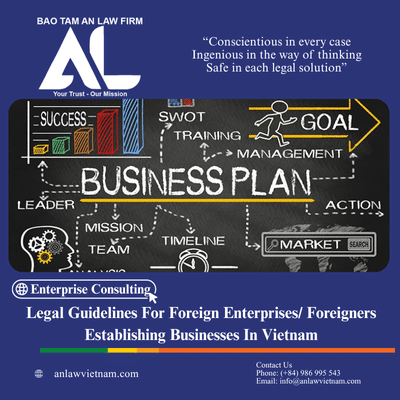Legal Guidelines For Foreign Enterprises/ Foreigners Establishing Businesses In Vietnam
Overview: Why Understanding Legal Regulations Is Crucial When Starting a Business in Vietnam
Vietnam has become an attractive destination for international startups thanks to its stable economic growth, young population, and increasingly open investment environment.
However, for a foreign enterprise to operate legally and sustainably in Vietnam, understanding and complying with the local legal framework is a decisive factor.
This article provides a comprehensive guide to the legal regulations, investment procedures, and key considerations to help foreign startups establish their businesses in Vietnam efficiently and lawfully.

Capital Contribution Assets
Under Vietnamese law, capital contribution assets may include:
- Vietnamese Dong, freely convertible foreign currency, or gold;
- Land use rights, intellectual property rights, technologies, and technical know-how;
- Other assets that can be valued in Vietnamese Dong.
Forms of capital contribution:
- Assets not subject to ownership registration (e.g., cash, gold, etc.): contributed directly and confirmed by a written record or bank transfer;
- Assets subject to ownership registration or land use rights: contributors must complete ownership or land use right transfer procedures in the company’s name. Notably, such transfer is exempt from registration fees.
Capital Contribution Limits – How Much Is Enough for a Startup?
According to the Law on Enterprises 2020, Vietnamese law does not impose minimum or maximum capital contribution requirements, except for certain regulated sectors (e.g., finance, banking, etc.).
Thus, investors have flexibility in determining their charter capital according to the business scale, objectives, and financial capacity. However, note the following:
- Overly low registered capital may raise doubts about financial capability, affecting credibility and future fundraising;
- Excessively high registered capital may create financial pressure, as the law requires full capital contribution within the statutory timeframe, along with transparent financial reporting.
Capital Contribution Ratio and Management Rights
- The capital contribution ratio directly affects management rights, voting rights, and profit-sharing among members or shareholders.
- Therefore, parties should agree clearly on ownership ratios from the outset to avoid future disputes.
- Depending on the enterprise type (Limited Liability Company, Joint Stock Company, etc.), each member’s rights and obligations are determined according to their capital ratio.
Capital Contribution Deadline
- Under Articles 47, 75, and 113 of the Law on Enterprises 2020, investors must fully contribute the committed capital and in the agreed form within 90 days from the issuance date of the Enterprise Registration Certificate (ERC).
- This timeline applies to all enterprise types (single-member LLC, multi-member LLC, or joint stock company).
Procedure for Establishing a Foreign Startup in Vietnam
Establishing a foreign-invested enterprise involves two main stages:
Step 1: Obtain the Investment Registration Certificate (IRC)
- Application dossier includes:
- Investment project proposal (objectives, scale, capital, location);
- Legal documents of the investor;
- Business plan and proof of financial capacity.
- Licensing authority: Department of Planning and Investment (DPI) or the Management Board of Industrial/Hi-Tech Zones (if the project is located therein).
Step 2: Obtain the Enterprise Registration Certificate (ERC)
- Application dossier includes:
- Application for enterprise registration;
- Company charter;
- List of members/shareholders;
- IRC and legal documents of the legal representative.
- Once the ERC is granted, the company is officially recognized as a foreign-invested legal entity in Vietnam.

Legal Guidelines For Foreign Enterprises/ Foreigners Establishing Businesses In Vietnam
Key Legal Areas Foreign Startups Must Pay Attention To
(1) Taxation and Accounting
- Startups must register for a tax identification number and comply with all financial obligations:
- Corporate Income Tax (CIT): 20%; incentives available for high-tech, education, and clean energy sectors;
- Value-Added Tax (VAT): 0% – 10% depending on business activities;
- Withholding Tax: applicable to payments to foreign contractors;
- Transfer Pricing Disclosure: required for enterprises with related-party transactions.
- Annual financial statements must be audited independently and submitted on time.
(2) Labor and Human Resources
- According to the Labor Code 2019:
- All labor contracts must be in writing, specifying job title, salary, and working hours;
- Employers must register social, health, and unemployment insurance for employees;
- Foreign employees must obtain a Work Permit and a valid visa/residence card (TRC, LD1, LD2).
(3) Intellectual Property (IP)
- For startups in technology, innovation, or branding, IP protection is vital:
- Register trademarks and logos with the National Office of Intellectual Property (NOIP);
- Register copyrights for software, user interfaces, and digital content;
- Establish internal IP ownership agreements to clarify rights between employees and the company.
- (4) Profit Repatriation and Investment
- Foreign investors may remit profits abroad after fulfilling tax obligations; however, all capital transactions must be conducted through a Foreign Direct Investment (FDI) Account to ensure transparency.
Common Challenges
- Complex and frequently changing legal framework;
- Language barriers and time-consuming administrative procedures;
- Cultural differences in business practices between foreign investors and Vietnamese partners;
- Limited in-house legal resources, leading to compliance risks without professional advice.
Solutions for Compliance and Sustainable Growth
- Develop a legal plan from the outset: define investment model, ownership ratio, and share structure clearly;
- Engage a reputable law firm: to expedite licensing procedures and minimize administrative risks;
- Train legal awareness among staff regarding tax, contract, insurance, and confidentiality regulations;
- Maintain transparent record-keeping including IRC, ERC, contracts, and tax reports;
- Stay updated with legal changes via seminars, newsletters, or business associations such as AmCham or EuroCham.
- Compliance is not merely an obligation — it is the foundation for building trust with investors, regulators, and strategic partners.
Conclusion
The Vietnamese market offers vast opportunities for international startups in sectors such as technology, fintech, education, e-commerce, and agri-tech.
However, opportunities turn into success only when businesses build a solid legal foundation and strictly comply with local regulations.
With years of experience advising foreign corporations and startups, An Law Vietnam proudly accompanies you on your journey in Vietnam — from initial legal strategy to long-term expansion.
Contact An Law Vietnam for specialized legal consultation for foreign startups:
📞 Phone: (+84) 986 995 543
📧 Email: info@anlawvietnam.com
📍 Head Office: Diamond Plaza, 34 Le Duan Street, Sai Gon Ward, Ho Chi Minh City
🏢 Vung Tau Branch: Vo Thi Sau Street, Vung Tau Ward, Ho Chi Minh City

